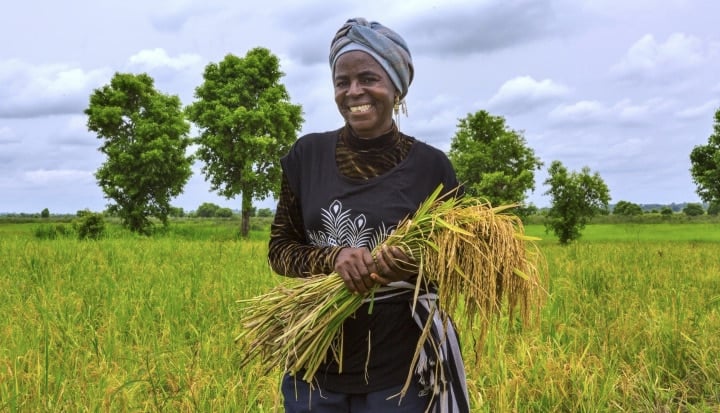The Value Chain Development Program (VCDP) is a partnership between the Federal Government of Nigeria, IFAD and Olam. It works to connect smallholder farmers to markets, land, credit and other agricultural support to improve productivity, the quality of their produce and their linkage with agro-processors for the buying of this produce. In turn, this supports the Government’s ambition to transform agriculture into a profitable venture for young people and boost domestic food security.
In a nutshell, what is the idea behind the partnership?
With a population of around 200 million, Nigeria is the largest country in Africa but spends around US$6 billion on agricultural imports every year. As rice consumption in Nigeria continues to grow with the population, the Federal Government of Nigeria (FGN) is promoting policies and investments to ensure that agricultural production keeps pace with domestic demand.
Smallholders in Nigeria make up more than 70 per cent of the total farming population, and most of them are still in subsistence farming. The aim of the FGN is to support them to become agri-entrepreneurs taking advantage of Nigeria’s potential for domestic production. The Government’s policies also identify the transformation of the agricultural sector as critical for employment generation including for young people.
Olam was already working closely with over 22,500 rice farmers in Nigeria through sustainability programmes, but delivering impact at scale requires looking beyond our four walls; to a space for all actors in the rice value chain to engage with each other and leverage our joint capacity to address the market, production and policy limitations.
What actions are happening on the ground?
Under VDCP, farmers organise into formal groups, through which they can access land, extension services, and agri-inputs; essentially everything they need to increase their productivity and quality standards.
Farmers also have better access to credit thanks to new partnerships with financial institutions, as well as receiving training to develop the financial literacy and business management skills necessary to engage with the market and supply the required volumes and quality.
The partnership established the Commodity Alliance Forum (CAF) as an implementation model for scaling up VCDP, targeting rice farmers and buyers. By linking farmers with major buyers (like Olam), financial institutions, seed and fertiliser input companies, and the government, VCDP empowers them to actively engage in business and policy discussions.
The partnership has also incentivised other industries and providers to work with smallholders to improve agricultural practices. For example, weather index operators and meteorological agencies are promoting environmentally friendly climate-smart practices to mitigate annual flooding.
What difference has this made for the farmers and other actors in the rice value chain?
The collaboration under VCDP brings mutual benefits – providing rice smallholders in Nigeria with support, allowing them to be more productive means they increase their incomes, while consistent and high-quality supplies of rice are making a significant contribution to national priorities on import substitution and food security. To date:
- 3,292 purchase agreements have been signed to date between individual farmers’ organisations and major buyers.
- Additional produce aggregation centres, or storage facilities, have been either constructed or rehabilitated, which has reduced post-harvest losses by 70 percent
- Farmers have produced and marketed over 450,000 metric tons of rice, with a 125% increase in yields – from less than 2 MT/ha to an average of 4.5 MT/ha – while cassava yields have grown by 66%
- 70% of the 45,000 participating smallholders, processors and marketers are now linked to buyers and have guaranteed access to markets for their produce, resulting in them doubling their agricultural income.
- In three years, roughly $137.5 million from sales was deposited in the bank accounts of these farmers.
- There has been a spike in demand for local rice and cassava products with the knock-on effect of stimulating new and attractive job opportunities in production, processing and marketing for young people and women in rural communities. (Women represent 40% of the VCDP beneficiaries, which is significant given the resource constraints are often even bigger for them.)
Looking at industry-wide changes, it has been encouraging to see more smallholder farmers partnering and securing long-term deals with national and international agri-businesses. This is a step change for many farmers from the previous supply-driven market and has allowed them to move away from subsistence farming into commercial agriculture.
What are the next steps to scale up impact?
Given the FGN target to lift 40 million people out of rural poverty, we need to increase our outreach. So working with the FGN and IFAD, we are now aiming to reach a further 55,000 smallholders. The next step is to expand the partnership beyond rice and cassava to other commodities and producers.
To support this, we are looking to secure wider collaboration with other development partners, agri-business operators and sub-regional bodies to scale up the impact of the partnership. To enable this, we have organised a national workshop and have already secured the commitment of national and state governments to roll the partnership out to new parts of the country. To get in touch: ri**@ol*****.com
About the P3 Impact award
The P3 Impact Award was created by Concordia, the University of Virginia Darden School Institute for Business in Society, and the U.S. Department of State’s Office of Global Partnerships to recognise and honour leading public-private partnerships (P3s) that improve communities and the world.










